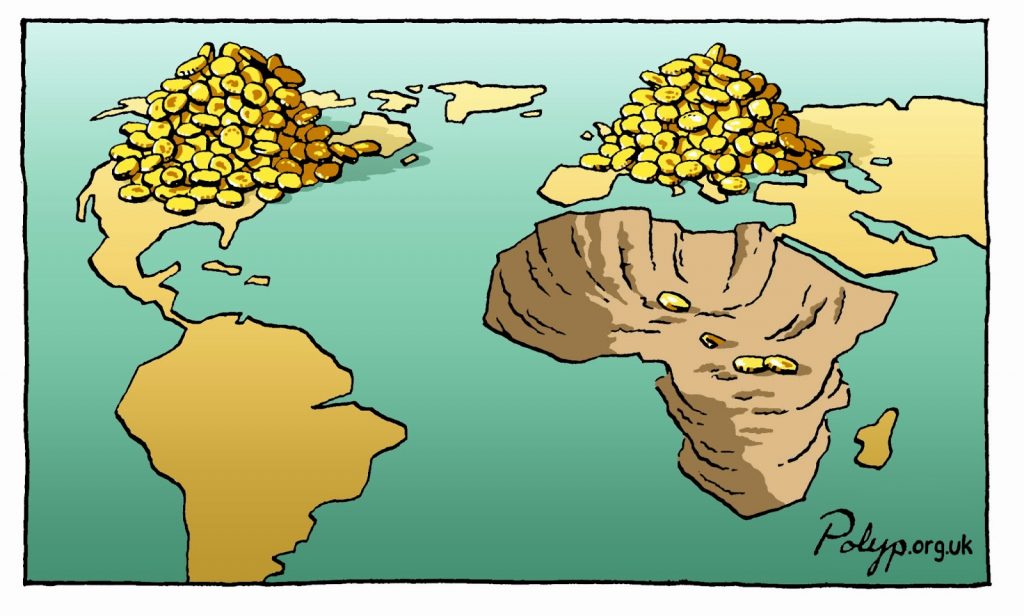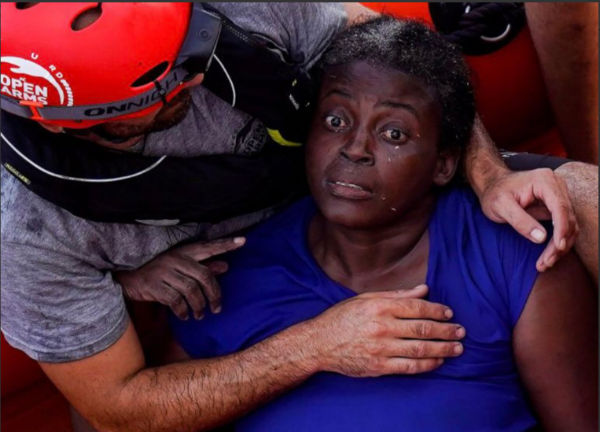
The EU rhetoric heavily focuses on stopping smugglers from exploiting people and putting their lives at risk, instead of examining what induces them to seek the services of smugglers in the first place.
by Michael Grech
Image: Gold Diggers by Polyp.org.uk
[dropcap]W[/dropcap]ith the election of the Five Star Movement / Northern League coalition in Italy, the immigration issue has once more made it to the front pages of the mainstream media. The images of vessels carrying dark-skinned persons from port to port have divided the public across Europe and the Mediterranean, with some churning nationalistic rhetoric (be this Maltese, Italian, or other) verging on racist and chauvinistic, and others pointing to humanitarian concerns that should trump all other considerations.
Anyone with a minimal sense of decency would side with the latter part of the ‘audience’. I definitely do. Yet, in what follows I jot some considerations on what are common limitations of this way of looking at the issue in Maltese and European liberal audiences; limitations which, to my mind, ensure that ultimately both nationalistic-chauvinistic rhetoric and mainstream humanitarian discourses end up feeding each other.
Humanity? Thank You … but Maybe, No, Thank You

It is callous not to be moved to tears by the stare of Josepha. It is however inane to stop at the tears this stare will cause you, if you are not as callous. If one’s attitude to immigrants begins and stops at humanity, one’s attitude to these unfortunates is poor and cheap. Migration is not primarily an issue of humanity or morality. It is an issue of justice and unequal exchanges. It is an issue of inequality both in economic and political terms.
There would be no plight of people crossing the Mediterranean if the wealth of sub-Saharan Africa was not being pirated to other parts of the world, including ours. There would be no irregular migration if you and I were not benefiting from this act of piracy. There would be no refugees if our lifestyle had not caused phenomena like climate change which institutions like the Christian Science Monitor indicate as the second largest cause of immigration (because of effects like drought, desertification etc.). There would be no asylum seekers if wars were not fomented, caused, sponsored and supplied by First World countries.
[beautifulquote align=”left” cite=””]Immigration is an issue of justice and unequal exchanges. It is an issue of inequality both in economic and political terms.[/beautifulquote]
To deal reasonably, responsibly and in good faith with the tragedy of people whose rights are regularly contested, humanity-considerations are a necessary starter. But they are not enough.
Using heart-breaking language regarding the stare of Josepha and the moral regurgitation this is supposed to cause is nice and poetic, but also short-term and politically impotent. It might lead one to think that the issue is all about ensuring that migration is safe. (A myth. More about this below). Humanity is necessary to conceive the issue, but still is insufficient. We should move from humanity to justice. That is the kernel of the issue.
Apart from other shortcomings, focusing exclusively on humanity might lead one to exonerate—if not actually look up to—certain characters who churn humanitarian rhetoric, but who actually perpetuate the status quo in relation to the reasons and causes that are inducing people to flee their country of origin. More on this next.
No ‘Good Guy’ vs ‘Bad Guy’ Match
Another irrational tendency in many ‘humanitarian’ takes on the immigration issue is the ‘good guy’/’bad guy’ Manichean divide when it comes to political leaders and institutions.
So, given the standard liberal rhetoric, Obama was the good guy while Trump is the personification of evil. The EU is a benign institution that welcomes immigrants and believes in the multi-[insert your nice term of choice], while EU-skeptic parties and individuals are chauvinistic and exclusionary. There is more complexity to it. Trump may be a filthy so-and-so, but under Obama the US frontier with Mexico had already been sealed and heavily militarized, with immigrants caught moving to the US side of the border ending up locked in dog-catcher like vehicles and repatriated.
[beautifulquote align=”left” cite=””]The EU rhetoric heavily focuses on stopping smugglers from exploiting people and putting their lives at risk, instead of examining what induces them to seek the services of smugglers in the first place.[/beautifulquote]
Similarly, the EU is full of rhetoric about the safety of immigrants, integration and recognising (some sort of) rights to those who make the trip from the shores of North-Africa and survive crossing the sea. Yet, these unfortunates are still considered as ‘burden’ to be shared—rather than victims of injustice—and one primary aim of EU policy/rhetoric is to stop smugglers from exploiting these unfortunates and putting their lives at risk; failing to ask the very basic question as to what induces these unfortunates to seek the services of smugglers in the first place. This means that even if those who smuggle immigrants by boat are stopped, the latter will seek other means to cross to this part of the world.
Why does the EU not punish those European multinationals who (together with American, Chinese and other multi-nationals) are robbing parts of the Third World and/or those European countries that sell weapons and foment wars? Is it ultimately because their benign rhetoric is still riddled with Euro- or First World-centric biases, which induce one to value less the rights and lives of people who hail from other parts of the world? Is it because it ultimately fails to recognise the legitimate claims of the ‘undesirables’ who are running for safety/after their wealth?
A few nice words plus the funding of a few projects and our conscience is soothed? Seeing beyond such rhetoric helps one make a better analysis of the situation. Some of this rhetoric concerns the economy.
What is Real Must Have Somehow Been Rational
Liberal discourse frequently refers to the welcoming of immigrants as a win-win situation. ‘United we stand, divided we fall’. One wonders why prejudices exist since welcoming immigrants is so logical and rational. From one point of view all this is true. From an another it is deeply irrational. Claiming that a society is better off if it welcomes immigrants is conceptually very shallow because it assumes that society is a homogeneous structure, and not a hierarchy of classes and other groups having definite economic, political and cultural interests, some of which may be antithetical to each other.
[beautifulquote align=”left” cite=””]It is definitely in the interest of the working class and of other exploited groups not to be divided along lines of creed or (supposed) race, and be pitted one against the other along such lines.[/beautifulquote]
Welcoming immigrants is definitely in the interest of local working class and of other exploited groups, especially since most immigrants who come by boat join this class and end up in the lowest echelons of society. It is definitely in the interest of the working class and of other exploited groups not to be divided along lines of creed or (supposed) race, and be pitted one against the other along such lines. It is, however, in the interest of some other groups that such divisions exist.
Poor locals will look at the poor immigrants as the source of their ills rather than at the thriving fat cats.
Phenomena like unfair competition in the job market, which the number and status of immigrants will help, will make some of the opulent richer and better off. The fact that a good number of immigrants are here but are in a legal limbo or enjoy fewer rights than locals (something abetted by benign-sounding politics which wants immigrants here, but does really not given them equal rights as other members of the labour market), creates something comparable to Marx’s reserve army of unemployed; a supply of labour which, with the added benefit of a precarious legal situation, can help keep wages low and pull down the conditions of employment.
[beautifulquote align=”left” cite=””]Safe immigration from the Global South will not be on the cards of major political institutions in our part of the world as long as these keep representing the interests of the have lots.[/beautifulquote]
This suggests that even the idea of safe and legal immigration from the Global South, which many well-intentioned individuals suggest (as I’ve done many a time), is not really something that can be on the cards of major political institutions in our part of the world as long as these keep representing the interests of the have lots. To the latter it is important that large enough numbers leave impoverished areas in the Global South, that they leave in the way they leave, and that those who make it to our part of the world (many will die in the process) are in the precarious social and legal situation they end up in.
Thus, safe immigration, integration and the like may not be in the interest of everyone in society, despite the trendy slogans.
There are some who are benefiting from having immigrants here but not in other places, integrated in some respects but not in others. Failing to see this means failing to militate properly for and with immigrants. Regarding the local working class members, who unfortunately frequently misperceive the immigrant as the main cause of their ills, those who are committed to immigrants should seek to engage with this and not fatalistically resign to losing this sector of society to the extreme Right. In Britain and Europe in the first half of the past century, it was primarily white working class people who fought Fascism in the streets.
Immigration and War
Just as immigration cannot be considered independently of global, regional and national economics, and of the issues of justice, it equally cannot be considered without taking notice of international politics, power struggles between nations and military blocs, and war. The latter is one of the major causes of migration.
Unfortunately, many individuals and organisations who are genuinely committed to the welfare of immigrants fail to see the link. How would one otherwise explain the fact that when a few years ago the EU lifted an embargo on the sales of weapons to Syria—and the Maltese Minister for Foreign Affairs failed to oppose the decision, even though he believed it was wrong—only six individuals expressed their disapproval publicly? Why is it that only a handful express concern when suggestions are made that Malta should ditch neutrality and join NATO?
The latest NATO intervention in our neighbourhood—Libya—a few years ago was anything but beneficial to immigrants in that country. Why is it that only a few activists signed an appeal urging the Maltese government not merely to refrain from joining PESCO (the suggested EU army) but to state that the European block invests in a politics of peace rather than warfare? Why is it that almost no one pressures government to abide by the clause in our constitution that enjoins it to work actively for peace and prosperity in the world? Failing to see the link between these issues and immigration is to say the least myopic, no matter how humane one’s attitude is.